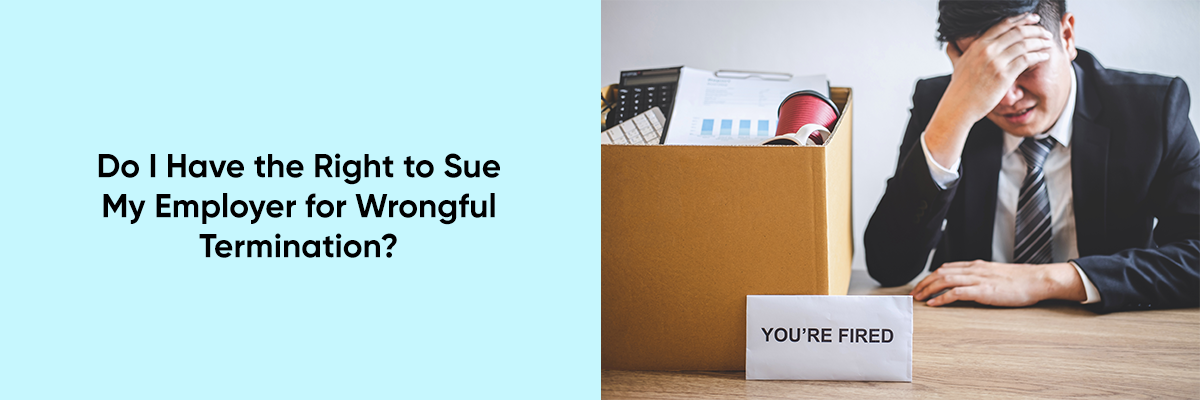If you find yourself in a situation where you’ve been terminated from your job, you might be asking, “What does the law say about wrongful termination, and what rights do I have as an employee?” Understanding these aspects is crucial because wrongful termination can happen under various circumstances, and knowing your legal protections can empower you to take action.



This blog is beneficial not only for employees but also for employers. It provides essential information that employers and HR managers can use to avoid mistakes that may lead to wrongful termination lawsuits. If you’re interested in exploring more engaging topics, we invite you to check out the free blog resources on our website. Additionally, you can enroll in our on-demand human resource webinars and upcoming sessions led by industry experts. The insights gained from these expert-driven webinars will empower you to build a high-performing team that drives your company to the next level and enhances profitability.
What is Wrongful Termination?
Wrongful termination occurs when an employee is fired in violation of legal protections or contractual agreements. While it may seem straightforward, the nuances can vary significantly based on your situation and where you live. Typically, there are two main types of wrongful termination: one that is clearly illegal and another that might feel wrong but doesn’t meet legal criteria.
Scenarios of Wrongful Termination
Discrimination
Imagine you secured a job, but later a manager decided to fire you based on your gender, race, age, national origin, disability, or any other protected characteristic. This clearly constitutes wrongful termination. Discrimination in the workplace is illegal, and if your termination was based on these factors, you may have a valid claim.
Retaliation
If you reported company wrongdoing or acted as a whistleblower and were subsequently terminated in retaliation, this is also considered wrongful termination. Employers cannot fire employees for taking protected actions, such as reporting illegal activities or unsafe practices.
Violation of Public Policy
Suppose your employer pressures you to engage in unethical behavior, such as committing fraud against customers or concealing information from shareholders. If you are fired for refusing to participate in such activities, it may be classified as wrongful termination, as it violates public policy.
Violation of Employment Contract
Most employment contracts outline the terms and conditions of employment, including the circumstances that could lead to termination. If you are terminated for reasons not specified in your contract, this may constitute wrongful termination. Employers must adhere to the agreed-upon terms.
Constructive Dismissal
Constructive dismissal occurs when an employer creates a hostile work environment, making it unbearable for an employee to continue working. If your employer’s actions made you feel mentally exhausted and frustrated to the point where you feel you have no choice but to resign, this may be considered wrongful termination. In such cases, the employer’s actions effectively force the employee to quit.
Scenarios That May Feel Like Wrongful Termination but Aren’t
Breach of Contract
If you believe you were terminated in violation of your employment contract, it’s essential to consider the contract’s specifics. However, if the termination was justified based on the terms outlined in the contract, it may not qualify as wrongful termination, regardless of whether you perceive it as fair or not.
Termination Without Cause in At-Will Employment
In at-will employment situations, employers have the right to terminate employees for any reason, as long as it is not illegal. If you are terminated without cause in this context, it does not typically constitute wrongful termination.
Poor Performance or Misconduct
If your employer terminates you due to consistently poor performance or misconduct, this may not be considered wrongful termination. Employers have the right to set performance standards and expect adherence to workplace conduct.
Layoffs Due to Economic Reasons
Economic downturns can lead to layoffs, and if your termination is part of a company-wide reduction, it generally does not qualify as wrongful termination. Employers must make difficult decisions to ensure the financial stability of the business.
Firing Based on Company Policy Violations
If you are fired for violating established company policies, such as attendance rules or safety regulations, this may not be seen as wrongful termination. Employees are expected to adhere to company policies, and failure to do so can lead to disciplinary action.
Termination Due to Workplace Restructuring
Organizational changes, such as mergers or restructuring, can result in job eliminations. If your position is eliminated as part of this process, it typically does not qualify as wrongful termination, as it is often a business necessity.
Legal Protections Against Wrongful Termination
So, what does the law say about wrongful termination?
Federal Laws
Several federal laws protect employees from wrongful termination, including:
- Title VII of the Civil Rights Act of 1964: This law prohibits discrimination based on race, color, religion, sex, or national origin. If you believe you were fired for any of these reasons, it could constitute wrongful termination.
- The Americans with Disabilities Act (ADA): This act protects individuals from being terminated due to their disabilities. Termination for this reason can lead to a valid claim.
- The Age Discrimination in Employment Act (ADEA): If you’re over 40 and were let go due to your age, you may have grounds for a wrongful termination suit.
State Laws
Many states provide additional protections. For instance, it may be illegal to fire someone for:
- Reporting illegal activities (whistleblowing).
- Taking legally protected leave (like Family and Medical Leave Act – FMLA).
- Engaging in union activities.
Employee Rights in Wrongful Termination Cases
As an employee, you have specific rights if you believe you’ve been wrongfully terminated:
- Right to Seek Legal Advice: Consulting an employment attorney can clarify your rights and help assess your case.
- Right to File a Complaint: You can file a complaint with agencies like the Equal Employment Opportunity Commission (EEOC), which investigates claims of discrimination or retaliation.
- Right to Recover Damages: If you prove your case, you may be entitled to various forms of compensation.
So, yes, you do have the right to sue your employer for wrongful termination, but you must be certain about your claim. Carefully review your termination scenario, employment contract, company policies, and applicable federal and state laws. If you determine that your termination was wrongful and it has negatively impacted you and your family, consider taking legal action against your employer. However, it’s important to understand what you can gain from pursuing this route before making your decision.
Potential Outcomes of Suing an Employer
If you decide to file a complaint or sue your employer, what can you gain from this process? If you successfully pursue a wrongful termination claim, here are some possible outcomes:
- Reinstatement: In some cases, you may be reinstated to your former position.
- Back Pay: You could recover lost wages from the time of your termination until the resolution of your case.
- Front Pay: If reinstatement isn’t feasible, you may receive compensation for future lost wages.
- Compensatory Damages: These can cover emotional distress or reputational harm caused by your termination.
- Punitive Damages: In severe cases, punitive damages may be awarded to penalize the employer’s wrongful conduct.
- Attorney’s Fees: If you win your case, the court may require your employer to pay your legal fees.
Conclusion
In conclusion, if you feel you have been wrongfully terminated, it’s vital to understand your rights and the legal avenues available to you. The laws surrounding wrongful termination are complex, but you are not powerless. By consulting with a legal professional and gathering evidence related to your case, you can better navigate the situation and potentially seek the compensation you deserve. Employers should follow a proper employee termination checklist to ensure that nothing is done incorrectly during an employee’s termination, preventing the company from facing legal or other issues.


